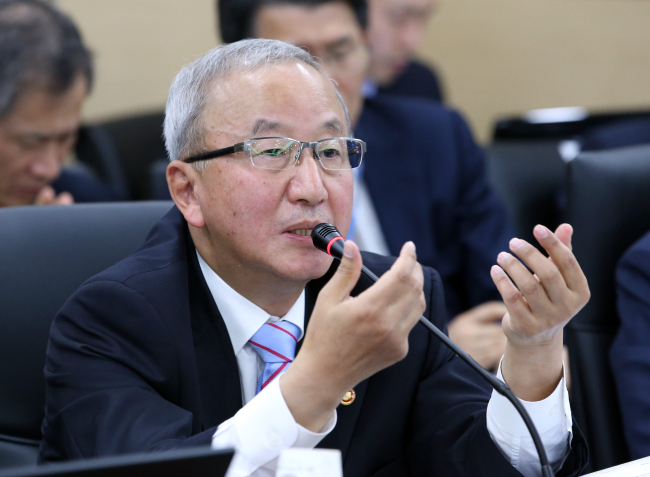기획재정부에 대한 16일 국회 기획재정위원회의 국정감사에서는 재정건전성과 경제성장률 문제가 도마 위에 올랐다.
경제정책 컨트롤타워로서 부총리의 역할, 공약이행 가능성, 양극화 문제도 집중적으로 거론됐다.
조정식 민주당 의원은 "가계부채가 980조원에 달하는 데다 국가채무도 443조원에 이르는 등 이미 임계치를 넘어선 '빚더미' 공화국이 되고 있다"면서 "강화된 부채 관리 기준을 마련해야 한다"고 포문을 열었다.
나성린 새누리당 의원은 "내년 예산안을 보면 총수입이 0.5% 감소하는 가운데 총지출은 4.6% 증가하는 등 지속적으로 복지재정을 확충해야 하는 상황에서 정부 의도대로 2017년에 균형재정을 달성할 수 있느냐"고 추궁하면서 "중기전망을 또다시 수정하는 상황이 올 수 있다"고 경고했다.
이런 문제의식은 증세 필요성에 대한 문제 제기로 이어졌다.
이용섭 민주당 의원은 "소규모 개방경제인 한국 입장에서 재정은 생명줄"이라면서 "감세 기조를 바꾸지 않으면 임기 말에 재정파탄이 반드시 온다"고 경고했다.
같은 당 문재인 의원은 "지금 당장은 증세를 하지 않는다 하더라도 지금쯤은 앞으로 증세가 필요할지, 또 한다면 어느 시기에 어떤 방향으로 증세할지 검토해야 한다"고 말했다.
김태호 새누리당 의원도 "증세 없는 복지라는 공약에 얽매여선 안 된다"면서 "대통령에게 정확하게 얘기해서 증세를 포함한 해결방안을 고민해야 후세에 짐을 떠넘기는 상황을 막을 수 있다"고 제안했다.
정부가 경제성장률을 과대 포장하고 있으며 이 과정에서 세입 결손이 발생한다는 데 대해서는 여야가 문제의식을 함께했다.
정성호 민주당 의원은 "정부가 올해 성장률 전망치를 2.7%, 내년 성장률을 3.9%로 제시한 데 대해 여야 모두 정부가 성장률을 낙관적으로 전망해 세입결손이 발생하고 있다고 본다"고 지적했다.
정 의원은 "정부가 내년에도 국세 수입이 추경 대비 3.9% 증가하리라 예측했는데 올해 세수 결손 등을 감안할 때 이는 무책임한 예측"이라고 비판했다.
이만우 새누리당 의원은 "정부는 성장률에 영향을 미치는 경제 주체로, 객관적인 성장률 전망 자체가 불가하고 특히 침체기에는 낙관적으로 예측하는 경향을 보인다"면서 "세입예산 작성 때 성장률의 일정 부분을 줄여서 반영하는 등 대안이 필요하다"고 제시했다.
김광림 새누리당 의원은 "정부의 연말 경제전망 수정치 발표 시기를 12월 초로 앞당겨 세입예산 심의에 반영할 수 있게 하고 국가재정법에 세계 경제 불확실성에 따른 세입 경정 등 추경 가능성을 열어놔야 한다"며 "증세를 하려면 법인세보다는 소득세 중심으로 해야 한다"고 말했다.
현오석 경제부총리 겸 기획재정부 장관이 경제 정책의 컨트롤 타워 역할을 제대로 못 하고 있다는 지적도 나왔다.
서병수 새누리당 의원은 "압축 성장의 패러다임에서 벗어나 경제적 전환기를 모색하는 시점에서 실질적인 컨트롤 타워가 돼야 할 경제부총리가 기대만큼 역할을 못하고 있다"고 비판했다.
류성걸 새누리당 의원은 "부총리는 경제 관련 정책을 총괄 지휘하고 집행을 책임지며 부처 간 이해관계를 조정하라는 임무를 부여받았는데 미흡했다"고 지적했다.
야당 의원들은 양극화 문제를 집중 거론했다.
홍종학 민주당 의원은 "경제성장의 과실이 기업, 특히 재벌에게 돌아가고 가계는 양극화가 심화되고 있다"면서 대책 마련을 촉구했다.
이낙연 민주당 의원도 "수도권과 비수도권, 호남과 영남, 흑자기업과 적자기업, 비정규직과 정규직 근로자 간에 임금·소득 격차가 커지고 있다"며 "사회 격차가 균열로 이어지지 않도록 해야 한다"고 강조했다.
민주당 최재성 의원은 "공약 반영 주요사업 16개를 자체 분석한 결과 전년 대비 예산증가율이 높은 것은 3건, 신규 1건뿐이고 12건은 증가율이 올해 예산에 못 미쳤다"면서 공약 이행이 제대로 되지 않고 있다는 점을 꼬집었다
<관련 영문 기사>
Finance minister draws fire for growth projection, state finances
By Choi He-suk
The Finance Ministry came under fire at the National Assembly on Wednesday over concerns about the country’s fiscal status and Minister Hyun Oh-seok’s alleged lack of leadership as the “economic control tower.”
Lawmakers from both the ruling Saenuri Party and the main opposition Democratic Party raised concerns about a sharp increase in state debt.
“Government debt has reached 443 trillion won ($415 billion) when household debt is already at 980 trillion won, (Korea) has become a debt-republic that has gone over the critical point,” the DP’s Rep. Choi Jeong-sik said.
“Stronger debt management standards need to be drawn up.”
Rep. Na Seong-lin of the Saenuri Party also questioned Hyun along similar lines, casting doubt on the government’s plans to achieve balanced finances by 2017.
According to Na, the Korean government’s income is projected to decrease by 0.5 percent next year, while expenditure is set to increase by 4.6 percent.
The legislators also raised concerns that the government may be too optimistic in projecting the country’s economic growth rate for next year.
The government projects that the country’s economy will grow by 3.9 percent in 2014.
“As an economic entity that affects the growth rate, the government is incapable of making an objective projection. During economic downturns, there is a trend of making optimistic projections,” Rep. Lee Man-woo of the Saenuri Party said.
“Alternatives such as lowering the growth projection when calculating the tax revenues are needed.”
DP lawmakers pressed the issue further, saying that the shortfalls in tax revenues were being caused by the optimistic economic outlook.
For his part, Hyun defended the projection saying that it was “very neutral” citing projections from other organizations that range from 3.8 percent to over 4 percent.
“The projection of 3.9 percent is based on the assumption that the results of the government’s policies reach their targets,” Hyun said. He added that stimulus measures that were rolled out during the first half of the year need to be continued through out the coming year, and that the projection also assumes that related regulations are passed by the National Assembly.
Regarding suggestions that the option of raising taxes should be left open, Hyun said that such steps would only be taken only if other measures fail.
“With regards to expenditure, pay-go regulations will be introduced to reduce unnecessary spending, and the underground economy will be regulated (to increase) tax income,” Hyun said.
“I think that the right order of things is to discuss tax raises with the public’s agreement, if the target is not satisfied by modifying other factors that can be changed.”
(
cheesuk@heraldcorp.com)




![[Herald Interview] 'Trump will use tariffs as first line of defense for American manufacturing'](http://res.heraldm.com/phpwas/restmb_idxmake.php?idx=644&simg=/content/image/2024/11/26/20241126050017_0.jpg)


![[Health and care] Getting cancer young: Why cancer isn’t just an older person’s battle](http://res.heraldm.com/phpwas/restmb_idxmake.php?idx=644&simg=/content/image/2024/11/26/20241126050043_0.jpg)
